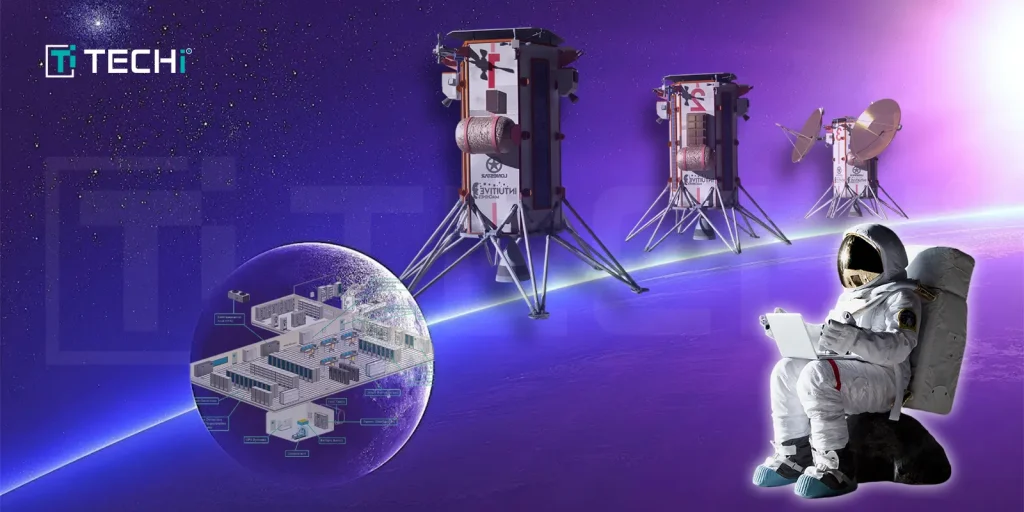Data storage is not so limited and is not only found in clouds, rather it goes beyond Earth’s atmosphere. This bold step takes the form of a collaboration between Lonestar and Phison to launch the first ever lunar data center. With cyber threats, climate risks, and AI-driven data demand soaring, of course, the race toward safeguarding the most prized human asset, information, has officially gone planetary.
The move to achieve data storage and resilience has now become more pronounced for Lonestar, along with Phison in rolling out a data center infrastructure aboard a SpaceX Falcon 9 rocket destined to the moon. The flight, which took place on Wednesday, will pave the way for developing a data storage site on the moon, a phenomenon mentored into changing the way humankind guards its dearest digital artifacts. The mission carries Phison’s PASCARI storage such as solid state drives engineered for data centers, all packed in Lonestar clients’ data. An initial lunar data center, landing on March 4, and then scaling to an eventual total capacity of a petabyte.
Future of a Space Storage Vision:
Chris Stott, Founder, Chair, and CEO of Lonestar, said that he has had this idea of an off-Earth data center since 2018. It has been since before any possible AI forwards has beaten up all the new demands on data storage about the development to house critical information outside the planet’s vulnerabilities took form. Stott said, “Humanity’s most precious item, outside of us, is data. They see data as the new oil. I’d say it’s more precious than that”.
Phison seemed a natural choice for partnership, as they were engaged in space missions already such as, its storage solutions powering NASA’s Perseverance Rover on Mars where Phison loaned its knowledge in designing customized SSDs for extreme conditions in space. Imagine Plus service customized the needed hardware according to Lonestar’s requirements. Michael Wu, the General Manager and President of Phison said, “We were very excited when there’s a call from Chris. We took a standard product and were able to customize whatever they need for these products and we launched it. So it’s a very exciting journey”.
Since their partnership in 2021, Lonestar and Phison took turns testing their technology rigorously to support it reliably before launch. Apparently, the SSDs needed to have high endurance for space. Stott said, “[This is] why SSDs are so important. No moving parts. It’s remarkable technology that’s allowing us to do what we’re doing for these governments and hopefully almost every government in the world as we go forward and almost every company and corporation”.
Growing Industry:
The tech has been ready for launch since 2023, with a successful test flight carried out in early 2024. Wednesday’s mission involved sending data from several governments concentrating on disaster recovery and a space agency testing a large language model. Even Imagine Dragons sent along a music video for the soundtrack from the Starfield space game!
Within this segment of companies wanting space data centers, Lonestar finds itself not alone. Starcloud, a Y Combinator Summer 2024 startup, was previously named Lumen Orbit, after closing over $21 million in funding. More companies will start looking at space solutions for massive storage and unlimited solar energy, which terrestrial data centers cannot compete with, as we know, in the time of ramping AI hardware demand.
Expansion Plans:
Presuming that everything goes as planned, it is anticipated that Lonestar will work alongside satellite producer Sidus Space to create a fleet of six dedicated data storage spacecraft with the launches scheduled for 2027 to 2030. Stott said, “It’s fascinating to see the level of professionalism, it is tremendous. This isn’t 60 years ago with the Apollo program. Apollo flight computers, they had 2 kilobytes of RAM and they had 36 kilobytes of storage. Here we are on this mission, flying 1 Gigabyte of RAM and 8 terabytes of storage with Phison Pascari. It’s tremendous”.
For reshaping the digital experience through artificial intelligence and cloud computing, secure and scalable data storage is now more urgent than ever. With Lonestar and Phison at the helm, the phrase becomes more than just stargazing, it becomes reality with space based data centers. Should such a mission succeed, it would herald a new age in which data resilience is no longer bound by Earth’s limitations. So, with many more launches forthcoming and increasing competition in the air, the future of space based infrastructure is about to take off.
Read More: Meta May Launch a Separate Video App for Instagram Reels




